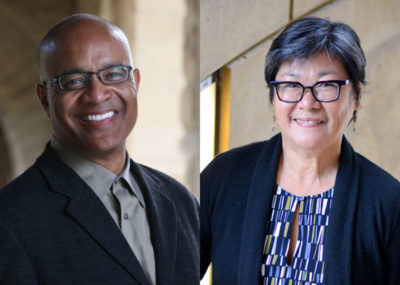New Stanford Center for Racial Justice
In June, Stanford University announced the establishment of the Stanford Center for Racial Justice (SCRJ), a new initiative anchored at the law school that aims to serve the entire university.
“The starting point for the center is the recognition that racial inequality and division have long been the fault line of American society. Thus, addressing racial inequity is essential to sustaining our nation, and furthering its democratic aspirations,” says Ralph Richard Banks, the Jackson Eli Reynolds Professor of Law and founding faculty director of SCRJ. Noting that the center is launching in a time of heightened racial tension in the country, Banks says there is an urgency to the mission. “Our aim is to make SCRJ a focal point for university efforts to undertake research on racial justice and to create a place where students and faculty come together to learn, share, and study this critically important issue. Our work will be policy focused—action oriented and relevant—and available to decision makers and lawmakers.”

Banks says that because racial justice issues touch all aspects of American society, the center will be a true multidisciplinary effort. “We aim to be the hub at the university for this work, bringing together students and colleagues from throughout the law school and across campus to contribute their knowledge and skills.”
SCRJ will use research to advance law and policy reform, engage in teaching and training to develop leaders, and pursue a range of strategic communications to provide critical information to the public. The Center has identified three areas of initial focus where systemic change is needed: criminal justice and policing, educational equity, and economic security and opportunity. SCRJ is exploring partnerships with Stanford colleagues at the School of Education and in the Department of Psychology.
Already, SCRJ has begun its work. Through a Policy Lab, Selective De-Policing: Operationalizing Concrete Reforms, Banks is working with leaders of Stanford’s Criminal Justice Center to supervise student research that supports the efforts of members of the African American Mayors Association to identify new and better approaches to meeting public safety needs consistent with budgetary realities. Diane T. Chin, SCRJ’s acting director and associate dean for public service and public interest law, is working with law students A.D. Sean Lewis, JD ’21, Mikaela Pyatt, JD ’22, and Tim Rosenberger, Jr., JD/MBA ’22, and partnering with the Legal Aid Association of California and the office of assembly member David Chiu to provide an equity analysis of the impacts of evictions, houselessness, and the anticipated eviction tsunami that will result when federal, state, and local eviction moratoria expire. The Center has also sponsored dozens of Zoom discussions on a range of race-related topics, including police reform, affirmative action, and diversity on corporate boards. During the next academic year, the Center will expand its student training opportunities and pursue additional projects.
“SCRJ will train the next generation of students to challenge entrenched racially inequitable policies, as lawyers and leaders, strengthening the legal sector to advance racial and social justice,” says Chin. “No fundamental change can occur without law and policy change. Our sector has a responsibility to meet society’s racial challenges with concrete skills and analysis.”
A fuller report on the new center’s work is planned for next year.
